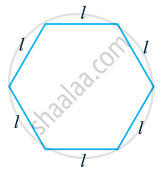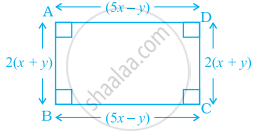Advertisements
Advertisements
प्रश्न
The sum of the multiplication table of natural number ‘n’ is given by 55 × n. Find the sum of table of 10.
उत्तर
Given, the sum of multiplication table of n natural numbers = 55 × n
Sum of table of 10 = 55 × 10 ......[Put n = 10]
= 550
APPEARS IN
संबंधित प्रश्न
Observe the patterns of digits made from line segments of equal length. You will find such segmented digits on the display of electronic watches or calculators.

If the number of digits formed is taken to be n, the number of segments required to form n digits is given by the algebraic expression appearing on the right of each pattern.
How many segments are required to form 5, 10, 100 digits of the kind −

Write down the following in the product form: x2y4
Write down the following in the product form: 9xy2z
If 9 is added to a certain number, the result is 36. Find the number.
The sum of three consecutive natural numbers is 114. Find the numbers.
If a number is tripled and the result is increased by 5, we get 50. Find the number.
A man is thrice as old as his son. Five years ago the man was four times as old as his son. Find their present ages.
The area of a square having each side x is ______.
The two digit number whose ten’s digit is ‘t’ and units’s digit is ‘u’ is ______.
If x is a negative integer, – x is a positive integer.
The side of a regular hexagon is denoted by l. Express the perimeter of the hexagon using l.
(Hint: A regular hexagon has all its six sides equal in length.)

Find the perimeter of the figure given below:

In a rectangular plot, 5 square flower beds of side (x + 2) metres each have been laid (see the figure). Find the total cost of fencing the flower beds at the cost of ₹ 50 per 100 metres:

The sum of first n natural numbers is given by `1/2n^2 + 1/2n`. Find the sum of natural numbers from 11 to 30.
The sum of squares of first n natural numbers is given by `1/6n(n + 1)(2n + 1)` or `1/6(2n^3 + 3n^2 + n)`. Find the sum of squares of the first 10 natural numbers.
If ![]() = 2x + 3,
= 2x + 3, ![]() = `3/2x + 7` and
= `3/2x + 7` and ![]() = x – 3 then find the value of:
= x – 3 then find the value of:
`1/2`![]() +
+ ![]() – 3
– 3![]()
